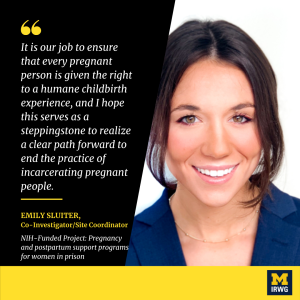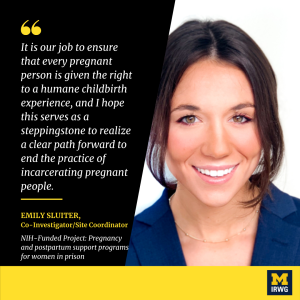NIH Funded Research Project: Pregnancy and postpartum support programs for women in prison


May 24, 2021
IRWG’s Consortium for Gender Responsive Prisoner Healthcare has been awarded a new grant as part of a five-year project funded by the National Institutes of Health. This multi-site collaboration seeks to understand how providing incarcerated pregnant women with enhanced pregnancy and postpartum care may improve maternal and neonatal outcomes. Driven by mandatory minimum sentencing, the criminalization of substance use disorder, the meth and opioid epidemic, and the lack of domestic violence shelters, affordable housing, and accessible mental health services, the rate at which women are incarcerated has increased over 600% over the last 30 years. Most of these women are of reproductive age, and an estimated 1 in 25 women will enter the prison system while pregnant.
The R01 project, “Pregnancy and postpartum support programs for women in prison: Maternal and neonatal outcomes," is a multi-site implementation study of enhanced pregnancy and postpartum support programs for women incarcerated in six geographically-diverse prisons in the U.S. The long-term goal is to provide valuable, practical, and actionable information to prisons about how to implement pregnancy and postpartum support programs to promote maternal and neonatal health.
In collaboration with principal investigator Rebecca Shlafer, PhD, MPH, Assistant Professor in the Division of General Pediatrics and Adolescent Health at the University of Minnesota, co-investigator Carolyn Sufrin, MD, PhD, Director of Advocacy and Research on Reproductive Wellness of Incarcerated People at Johns Hopkins University, as well as other interdisciplinary experts in the field, Consortium director Emily Sluiter will work in coordination with the Michigan Department of Corrections and Michigan Prison Doula Initiative (MPDI) and serve as a Co-Investigator/Site Coordinator at the University of Michigan. IRWG Director Anna Kirkland serves as the sponsor PI.
At each site, researchers will identify barriers and opportunities to implementing pregnancy and postpartum support programs for women in prison and evaluate pregnancy, birth and postpartum outcomes of program participants. As a previous doula and co-founder of the Michigan Prison Doula Initiative, Emily will use her prior experience of serving the women inside and working with stakeholders to use this work to identify and solve further gaps in pregnancy-related care.
“To every woman I’ve served inside, I’ve made a promise to keep pressing onward so that no one has to experience what it is like to give birth while incarcerated," said Sluiter. "These women are part of our community, which is an especially true reality for me coming from a small town where it is common to experience incarceration. It is our job to ensure that every pregnant person is given the right to a humane childbirth experience, and I hope this serves as a steppingstone to realize a clear path forward to end the practice of incarcerating pregnant people.”
